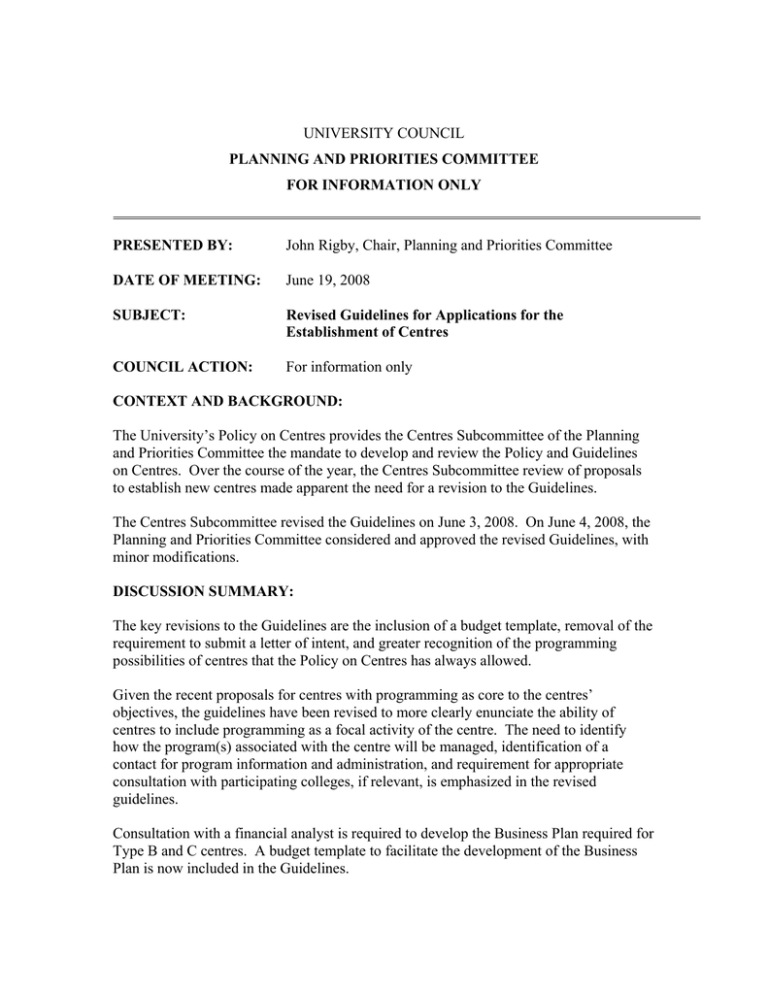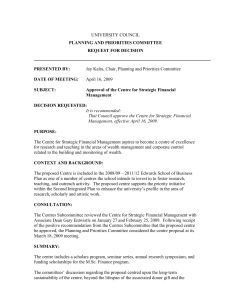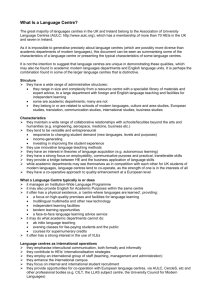UNIVERSITY COUNCIL PLANNING AND PRIORITIES COMMITTEE FOR INFORMATION ONLY
advertisement

UNIVERSITY COUNCIL PLANNING AND PRIORITIES COMMITTEE FOR INFORMATION ONLY PRESENTED BY: John Rigby, Chair, Planning and Priorities Committee DATE OF MEETING: June 19, 2008 SUBJECT: Revised Guidelines for Applications for the Establishment of Centres COUNCIL ACTION: For information only CONTEXT AND BACKGROUND: The University’s Policy on Centres provides the Centres Subcommittee of the Planning and Priorities Committee the mandate to develop and review the Policy and Guidelines on Centres. Over the course of the year, the Centres Subcommittee review of proposals to establish new centres made apparent the need for a revision to the Guidelines. The Centres Subcommittee revised the Guidelines on June 3, 2008. On June 4, 2008, the Planning and Priorities Committee considered and approved the revised Guidelines, with minor modifications. DISCUSSION SUMMARY: The key revisions to the Guidelines are the inclusion of a budget template, removal of the requirement to submit a letter of intent, and greater recognition of the programming possibilities of centres that the Policy on Centres has always allowed. Given the recent proposals for centres with programming as core to the centres’ objectives, the guidelines have been revised to more clearly enunciate the ability of centres to include programming as a focal activity of the centre. The need to identify how the program(s) associated with the centre will be managed, identification of a contact for program information and administration, and requirement for appropriate consultation with participating colleges, if relevant, is emphasized in the revised guidelines. Consultation with a financial analyst is required to develop the Business Plan required for Type B and C centres. A budget template to facilitate the development of the Business Plan is now included in the Guidelines. In communication with centres proponents, it became clear the requirement to submit a Letter of Intent for Type B and C Centres as a means to obtain feedback prior to formulating a formal proposal was creating an artificial and unnecessary step. By definition, Type B Centres involve activities beyond the scope of a single college, requiring significant resources and a clearly defined governance structure. In the course of developing these components, proponents, as expected, moved logically towards development of a full proposal. Requiring that a letter of intent be extracted from the draft proposal to meet the requirements of the Guidelines was viewed by the Committee as non-productive. This was further supported by the fact that the proposals received for Type B Centres by the Centres Subcommittee, which bypassed the letter of intent stage, were thoroughly conceived and well written. Type A proponents who formerly submitted only the letter of intent, which essentially served as a proposal, will now move directly to submission of a full proposal. Type A Centres are organizationally part of one college and generally do not involve substantial resources; therefore, the proposal submitted for Type A Centres will naturally be of a different scale and magnitude. As the letter of intent incorporated the elements outlined in the requirements for the full proposal, removal of the letter of intent stage was not viewed as detrimental to proponents for Type A Centres. ATTACHMENTS: 1. 2. University of Saskatchewan Policy on Centres Revised Guidelines for Applications for the Establishment of Centres






